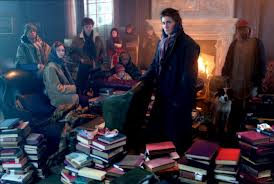For much of my life, getting rid of a book was blasphemy. Books have always been sacred to me. As a young person, I was deeply affected by an image of books being burned by Nazis. Piles of books up in smoke. In my personal Ten  Commandments, One Must Not Destroy Books. We all know where that can lead.
Commandments, One Must Not Destroy Books. We all know where that can lead.
There is a scene in the wonderfully cheesy disaster movie, The Day After Tomorrow, in which having taken shelter from a world-destroying storm in the New York Public Library, the characters begin to collect books they will burn to stay warm. One of the group objects and clings to a Gutenberg Bible, determined to save civ ilization until another quips that there can be no harm in burning the multiple volumes of the tax code. The point is well made. Not all books have equal value.
ilization until another quips that there can be no harm in burning the multiple volumes of the tax code. The point is well made. Not all books have equal value.
Three years too late, I have come across this sensible and well-written piece about downsizing books by Summer Brennan called “On the Heartbreaking Difficulty of Getting Rid of Books.” It is based on Marie Kondo’s The Life-Changing Magic of Tidying Up. (Aside: I like to imagine Kondo’s books gathering dust on shelves everywhere, but that reveals something perverse in my nature.) What Brennan has done is apply Kondo’s now iconic zeal to her own life in a way that makes sense to her.
Brennan captures what’s wrong with any “one size fits all” approach to book culling. She writes, “It occurred to me that part of the reason why tackling the ‘books’ stage of the Full Kondo seems so daunting is that to many of us our books don’t really belong in the category she has assigned. They are not impersonal units of knowledge, interchangeable and replaceable, but rather receptacles for the moments of our lives, whose pages have sopped up morning hopes and late-night sorrows, carried in honeymoon suitcases or clutched to broken hearts.” Yes, that is it. The piece is well worth reading if you are about to embark on a book cull. If you need further inspiration (and another book) go to the source material. Marie Kondo’s work has been much praised and mocked (a sure sign she is on to something) but I find there is something deeply consoling in her simple rule that one’s things should bring one joy.
Joy was the last thing on my mind when I moved from Calgary to Boston three years ago and faced the daunting task and considerable cost of moving fifty years of accumulated books. I cut my personal library in half. I never wanted to count how many books went. Too heartbreaking. I did it according to the space they took up. Each shelf was halved. I was methodical. For the most part, the Canadiana and hard to find books were boxed and went with me. Treasured gifts stayed. Books that brought me back to a specific time and place stayed. In short, books that had woven their way into the fabric of my life could not be given away. I worked hard to give my discards the possibility of a second life and keep them out of the landfill. If nothing else, I owed it to the trees.
Many of my Women’s Studies and feminist books went to two local women’s centres. That felt good. Except the ones I had to keep. Again, they were too much a part of me. I don’t even want to admit which books I ditched and which I kept for fear it will say too much about me. If I owned multiple books by one author, I would tell myself to keep only my very favourites. It was relatively easy to keep only two Dickens but then I kept every Carol Shields book. These were far too precious. I gave away Middlemarch, still unread since a Victorian Lit course in the 1980s.
Oh dear. I have revealed too much.
Of all the books I gave away three years (and two moves) ago, I have re-acquired only two. Oddly, one was Anne of Green Gables. Actually, I didn’t even have to buy it. A good friend, also moving, gave me one of her three copies. In the mean time, I have spared myself the cost of moving hundreds of books around (twice) and the cost of keeping a space to store them. Trust me, I still have a lot of books. For some reason, I feel it absolutely necessary to have six dictionaries.
Hard as it is to admit, you can have too much of a good thing. Even books.
